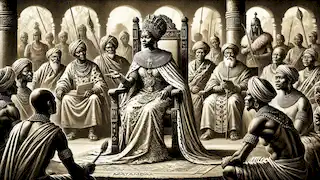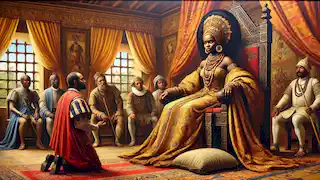In the heart of 17th-century Central Africa, amid the verdant landscapes and the dense, impenetrable forests of what is now Angola, a kingdom was in turmoil. The Kingdom of Ndongo, once a thriving and formidable state, found itself under siege by the relentless forces of the Portuguese Empire. The Portuguese, driven by their insatiable hunger for wealth, slaves, and territory, sought to expand their influence deep into Africa. Yet, they encountered a resistance so fierce, so determined, that it would etch itself into the annals of history. At the center of this resistance stood Queen Nzinga Mbande, a woman whose courage, intelligence, and leadership would defy the might of one of the most powerful empires of the time.
Nzinga was born in 1583 to King Kiluanji of Ndongo and Queen Kangela, into a royal lineage that was both revered and contested. As a young girl, Nzinga displayed remarkable intelligence and a keen sense of strategy, traits that were recognized early on by her father. In a society where leadership was predominantly male, Nzinga's upbringing was unusual; she was trained alongside her brothers in the arts of war, diplomacy, and governance. Her father, understanding the turbulent times that lay ahead, believed that Nzinga's talents would be indispensable to the kingdom's survival.
Ndongo's prosperity had long attracted the attention of foreign powers, but it was the arrival of the Portuguese in the late 16th century that posed the greatest threat. The Portuguese had established a foothold in Luanda, a coastal region that would become the capital of their colonial ambitions in Angola. From this base, they launched expeditions inland, seeking to conquer Ndongo and other neighboring kingdoms. The Portuguese were relentless in their pursuit, employing a combination of military force, deceitful diplomacy, and the manipulation of local rivalries to achieve their goals.

By the early 17th century, Ndongo was in a state of crisis. King Kiluanji, worn down by years of conflict, struggled to maintain control as the Portuguese advanced deeper into his territory. The kingdom's resources were stretched thin, and the constant threat of enslavement loomed over the population. It was during this time of uncertainty that Nzinga emerged as a crucial figure in Ndongo's defense.
In 1622, King Kiluanji, desperate to negotiate a peace that would preserve his kingdom, sent Nzinga as his envoy to Luanda. The mission was perilous; the Portuguese were known for their ruthlessness, and Nzinga's task was to negotiate with Governor João Correia de Sousa, a man notorious for his ambition and greed. Nzinga, however, was undeterred. Upon her arrival in Luanda, she was met with a deliberate insult—the Portuguese refused to provide her with a chair during the negotiations, forcing her to stand as a sign of subjugation. Unfazed by this slight, Nzinga ordered one of her attendants to kneel down, using the servant's back as a makeshift throne. This act of defiance was more than a clever improvisation; it was a powerful statement of her refusal to be diminished or humiliated.
The negotiations that followed were tense and fraught with danger. Nzinga, however, proved herself a master of diplomacy. She navigated the complex web of Portuguese demands with skill and tact, securing a fragile peace that temporarily halted the hostilities. As part of the agreement, the Portuguese promised to withdraw from certain territories and cease their raids on Ndongo. In return, Nzinga agreed to convert to Christianity, adopting the name Dona Ana de Sousa as a gesture of goodwill. While this conversion was strategic rather than spiritual, it demonstrated Nzinga's willingness to use every tool at her disposal to protect her people.
Despite the peace agreement, the situation in Ndongo remained precarious. King Kiluanji's health was failing, and the kingdom's stability was threatened by internal divisions and external pressures. The Portuguese, emboldened by their successes, soon broke the terms of the treaty, resuming their campaign of conquest and enslavement. The fragile peace crumbled, and Ndongo was plunged back into war.
King Kiluanji's death in 1624 marked a turning point in Nzinga's life. Her brother, Mbandi, ascended to the throne, but his rule was marked by weakness and indecision. Mbandi's inability to lead effectively in the face of the Portuguese onslaught led to widespread dissatisfaction and unrest. Many in the kingdom saw Nzinga as the true heir to their father's legacy, a leader who could guide them through the dark times ahead.

Nzinga, understanding the gravity of the situation, decided to act. In 1624, under circumstances that remain shrouded in mystery, Mbandi died, and Nzinga assumed the throne of Ndongo. Some accounts suggest that Nzinga may have played a role in her brother's death, though these claims are likely exaggerated by her enemies. What is certain is that Nzinga's ascension to power was met with both support and resistance. While many rallied behind her, recognizing her strength and leadership, others, particularly the Portuguese, sought to undermine her legitimacy.
As queen, Nzinga wasted no time in consolidating her power. She immediately moved to strengthen Ndongo's defenses, reorganizing the military and implementing new strategies to counter the Portuguese threat. Nzinga understood that direct confrontation with the Portuguese, who possessed superior weaponry and resources, would be futile. Instead, she adopted a strategy of guerrilla warfare, using the kingdom's dense forests and rugged terrain to her advantage. Her troops, highly mobile and familiar with the landscape, launched hit-and-run attacks on Portuguese outposts, disrupting their supply lines and weakening their resolve.
Nzinga's leadership extended beyond the battlefield. She was a shrewd diplomat, forging alliances with neighboring kingdoms and even with the Dutch, who were rivals of the Portuguese. Nzinga's alliance with the Dutch was particularly significant; it provided her with access to European weapons and military advisors, bolstering her forces and enabling her to continue the fight against the Portuguese.
In 1626, Nzinga faced one of the most challenging periods of her reign. The Portuguese, frustrated by their inability to defeat her, launched a massive military campaign to capture her. Nzinga's forces were outnumbered and outgunned, but she refused to surrender. In a daring move, she retreated with her people into the impenetrable forests of Matamba, a neighboring kingdom that she would later rule. From this new base of operations, Nzinga continued her resistance, leading her people in a protracted and brutal war of attrition against the Portuguese.
Matamba, under Nzinga's rule, became a powerful and independent kingdom. Nzinga declared herself queen of Matamba, solidifying her control over the region and creating a sanctuary for those fleeing Portuguese oppression. Matamba was more than just a military stronghold; it was a symbol of resistance and a beacon of hope for all who opposed colonial domination. Nzinga's rule in Matamba was marked by a commitment to the preservation of African culture and traditions, even as she skillfully navigated the complex politics of European alliances.

Nzinga's reputation as a warrior queen spread far and wide. She became known not only for her military prowess but also for her strategic acumen and unyielding spirit. European accounts of her often portrayed her as a fearsome and cunning leader, a woman who defied the conventions of her time and wielded power with an iron hand. Yet, Nzinga was also a compassionate leader, deeply committed to the welfare of her people. She implemented policies that promoted social cohesion and economic stability, ensuring that Matamba flourished even in the midst of war.
As the years passed, Nzinga's struggle against the Portuguese continued. Despite numerous setbacks, she never wavered in her determination to protect her people and preserve their independence. Her resilience and adaptability allowed her to outmaneuver the Portuguese time and again, frustrating their efforts to subjugate her kingdom.
By the 1640s, Nzinga's resistance had gained international attention. The Dutch, who were engaged in their own struggle against the Portuguese for control of the spice trade, saw an opportunity to weaken their rivals by supporting Nzinga. The Dutch provided Nzinga with arms, ammunition, and military advisors, bolstering her forces and enabling her to launch more effective campaigns against the Portuguese. This alliance was mutually beneficial; Nzinga gained much-needed resources, while the Dutch disrupted Portuguese operations in Angola.
In 1648, however, the balance of power shifted. The Portuguese, having defeated the Dutch in Brazil, turned their full attention to Angola. They launched a series of devastating attacks on Nzinga's forces, forcing her to retreat once more. Despite these setbacks, Nzinga refused to surrender. She continued to lead her people with courage and determination, rallying them to resist the Portuguese at every turn.

In her later years, Nzinga focused on securing a lasting peace for her people. She recognized that the endless cycle of war was taking a heavy toll on Ndongo and Matamba, and she sought to negotiate a settlement that would ensure their survival. Nzinga's diplomatic efforts culminated in a series of treaties with the Portuguese, in which they finally recognized her as the legitimate ruler of Matamba and agreed to cease their hostilities. This recognition was a significant victory for Nzinga; it marked the first time that the Portuguese acknowledged the sovereignty of an African ruler in Angola.
Nzinga's legacy, however, extends far beyond her military and diplomatic achievements. She was a pioneer in the struggle for African sovereignty and a trailblazer for women's leadership in a patriarchal society. Nzinga defied the gender norms of her time, taking on roles that were traditionally reserved for men and demonstrating that women could be
just as capable, if not more so, in positions of power. Her leadership inspired generations of African women to challenge the status quo and assert their rights.
Even as Nzinga worked to secure peace with the Portuguese, she remained deeply committed to the preservation of African culture and identity. She was a patron of the arts, supporting the continuation of Ndongo's spiritual and cultural practices. Nzinga's adoption of Christianity was strategic, a means to an end, but she never abandoned the traditional beliefs and practices of her people. She understood that cultural preservation was just as important as military resistance in the fight against colonialism.
Nzinga ruled Matamba until her death in 1663, at the age of 81. Her passing marked the end of an era, but her legacy lived on. Nzinga's life and achievements became the stuff of legend, a source of inspiration for those who continued the struggle for African independence and self-determination. Her story was passed down through generations, celebrated in songs, oral histories, and written accounts. Nzinga's legacy is not only a testament to her strength and resilience but also a reminder of the enduring power of African leadership and the importance of resisting oppression in all its forms.

Today, Queen Nzinga is remembered as a national hero in Angola and a symbol of resistance against colonialism and oppression. Her story continues to inspire those who fight for freedom, justice, and equality around the world. Nzinga's life is a powerful reminder that true leadership is not about wielding power for its own sake, but about using that power to protect and uplift others. Her legacy is a beacon of hope for all who strive to create a better, more just world.
Nzinga's impact can be seen not only in the history of Angola but also in the broader history of Africa and the African diaspora. Her story resonates with those who have experienced the struggles of colonialism, slavery, and discrimination, and it serves as a reminder of the resilience and strength that can emerge from adversity. Nzinga's example challenges us to confront injustice, to stand up for what is right, and to never lose sight of the goal of liberation for all people.
As we honor the memory of Queen Nzinga, we are reminded that the fight for freedom is ongoing. Her story teaches us that the path to justice is never easy, but it is one that must be pursued with determination, courage, and unwavering commitment. Nzinga's legacy lives on in the hearts and minds of all who continue to fight for a world where justice, equality, and freedom prevail.

















